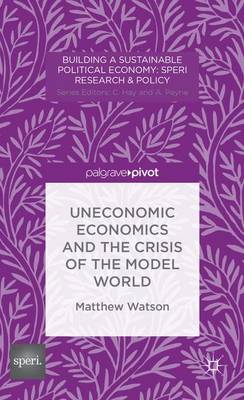Building a Sustainable Political Economy: SPERI Research & Policy
1 total work
Matthew Watson analyses the political response to imploding markets through the lens of the history of thought, asking 'what has gone wrong with economics?' against the backdrop of the global financial crisis. The most important historical trend, he suggests, is the development of an 'uneconomic economics' whereby attention is placed on explaining relationships in perfectly efficient blackboard markets rather than the much more chaotic institutions encountered in everyday economic interactions. Economists now routinely devise highly sophisticated abstract models which are theoretically rigorous but fail to capture the way businesses are actually undertaken. The acknowledgement of a gap between models and the real world has led many commentators to initially pronounce that the financial crisis was equally a crisis of economics. The author shows, though, that the subsequent redefinition of the crisis as a problem of over-extended state spending has successfully rehabilitated the model world of orthodox economics opinion.
